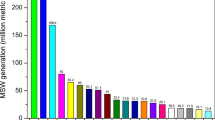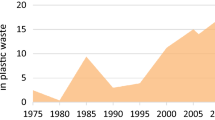Abstract
In this review, the issue of food recycling was comprehensively studied from the perspective of recent research. Firstly, the concept of circular economy and its application in reducing waste production and the strategies for waste reduction (waste prevention) were discussed. The concept suggests that we can produce less waste from the beginning to reduce costs for recycling, instead of generating much waste for recycling through specific approaches. Secondly, the results of several investigations on the recycling of various food wastes, which have been less considered important parts of waste management, such as university waste, agricultural waste, food industry waste, and spent coffee ground (SCG) waste, were discussed in detail. Finally, various methods for recycling and sustaining food wastes (improving the rates of recycling) and their application in aforementioned sections were comprehensively presented.







Similar content being viewed by others
References
Awasthi SK, Sarsaiya S, Awasthi MK, Liu T, Zhao J, Kumar S, Zhang Z (2020) Changes in global trends in food waste composting: research challenges and opportunities. Bioresour Technol 299:122555. https://doi.org/10.1016/j.biortech.2019.122555
Baron S, Patterson A, Maull R, Warnaby G (2018) Feed people first: a service ecosystem perspective on innovative food waste reduction. J Serv Res 21:135–150
Barrena R, Font X, Gabarrell X, Sanchez A (2014) Home composting versus industrial composting: influence of composting system on compost quality with focus on compost stability. Waste Manag 34:1109–1116. https://doi.org/10.1016/j.wasman.2014.02.008
Bas-Bellver C, Barrera C, Betoret N, Seguí L (2020) Turning agri-food cooperative vegetable residues into functional powdered ingredients for the food industry. sustainability 12:1284
Beckman J, Borchers A, Jones CA (2013) Agriculture’s supply and demand for energy and energy products USDA-ERS. Econ Inf Bull 112
Bhandari BR, Bansal N, Zhang M, Schuck P (2013) Handbook of food powders: processes and properties. Elsevier, Amsterdam
Block LG et al (2016) The squander sequence: understanding food waste at each stage of the consumer decision-making process. J Public Policy Mark 35:292–304
Brenes-Peralta L, Jiménez-Morales MF, Campos-Rodríguez R, De Menna F, Vittuari M (2020) Decision-making process in the circular economy: a case study on university food waste-to-energy actions in Latin America. Energies 13:2291
Cameron A, O’Malley S (2016) Coffee ground recovery program summary report Planet Ark: Sydney, Australia.
Chen Y-C, Jhou S-Y (2020) Integrating spent coffee grounds and silver skin as biofuels using torrefaction. Renew Energy 148:275–283
Dahiya S, Katakojwala R, Ramakrishna S, Mohan SV (2020) Biobased products and life cycle assessment in the context of circular economy and sustainability. Mater Circular Econ 2:1–28
Dietz T, Gardner GT, Gilligan J, Stern PC, Vandenbergh MP (2009) Household actions can provide a behavioral wedge to rapidly reduce US carbon emissions. Proc Natl Acad Sci 106:18452–18456
Elkhalifa S, Al-Ansari T, Mackey HR, McKay G (2019) Food waste to biochars through pyrolysis: a review. Resour Conserv Recycl 144:310–320
Esquivel P, Jiménez VM (2012) Functional properties of coffee and coffee by-products. Food Res Int 46:488–495
Garcia-Garcia G, Rahimifard S (2019) Life-cycle environmental impacts of barley straw valorisation Resources. Conservation and Recycling 149:1–11
Gentil EC, Poulsen TG (2012) To waste or not to waste–food? Sage Publications Sage UK, London, England
Goula AM, Lazarides HN (2015) Integrated processes can turn industrial food waste into valuable food by-products and/or ingredients: the cases of olive mill and pomegranate wastes. J Food Eng 167:45–50
Guan Y et al (2019) Pyrolysis kinetics behavior of solid leather wastes. Waste Manag 100:122–127. https://doi.org/10.1016/j.wasman.2019.09.005
Gundupalli SP, Hait S, Thakur A (2017) A review on automated sorting of source-separated municipal solid waste for recycling. Waste Manag 60:56–74. https://doi.org/10.1016/j.wasman.2016.09.015
Guo W et al (2018) On site composting of food waste: a pilot scale case study in China. Resources. Conservation and Recycling 132:130–138
Hebrok M, Boks C (2017) Household food waste: drivers and potential intervention points for design–an extensive review. J Clean Prod 151:380–392
Huysman S et al (2015) Towards a systematized framework for resource efficiency indicators. Resour Conserv Recycl 95:68–76
Ingrao C, Faccilongo N, Di Gioia L, Messineo A (2018) Food waste recovery into energy in a circular economy perspective: a comprehensive review of aspects related to plant operation and environmental assessment. J Clean Prod 184:869–892
ISO (2006) 14,040-Environmental Management e Life Cycle Assessment e Principles and Framework. (International Organization for Standardization).
Jose R, Panigrahi SK, Patil RA, Fernando Y, Ramakrishna S (2020) Artificial intelligence-driven circular economy as a key enabler for sustainable energy management. Mater Circular Econ 2:1–7
Jung S et al. (2020) Multifunctional bio-nanocomposite coatings for perishable fruits Advanced Materials:1908291.
Kalmykova Y, Sadagopan M, Rosado L (2018) Circular economy–from review of theories and practices to development of implementation tools. Resour Conserv Recycl 135:190–201
Karam MC, Petit J, Zimmer D, Djantou EB, Scher J (2016) Effects of drying and grinding in production of fruit and vegetable powders: a review. J Food Eng 188:32–49
Kaza S, Yao L, Bhada-Tata P, Van Woerden F (2018a) What a waste 2.0: a global snapshot of solid waste management to 2050. The World Bank,
Kaza S, Yao LC, Bhada-Tata P, Van Woerden F (2018b) What a waste 2.0: a global snapshot of solid waste management to 2050. Urban Development;. Washington, DC: World Bank. © World Bank. https://openknowledge.worldbank.org/handle/10986/30317. License: CC BY 3.0 IGO.”
Keng ZX et al (2020) Community-scale composting for food waste: a life-cycle assessment-supported case study. J Clean Prod 121220
Kim J, Rundle-Thiele S, Knox K, Burke K, Bogomolova S (2020) Consumer perspectives on household food waste reduction campaigns. J Clean Prod 243:118608
Laso J et al (2018) Finding an economic and environmental balance in value chains based on circular economy thinking: an eco-efficiency methodology applied to the fish canning industry. Resour Conserv Recycl 133:428–437
Ma P, Ke H, Lan J, Chen Y, He H (2019) Field measurement of pore pressures and liquid-gas distribution using drilling and ERT in a high food waste content MSW landfill in Guangzhou, China. Eng Geol 250:21–33
Maina S, Kachrimanidou V, Koutinas A (2017) A roadmap towards a circular and sustainable bioeconomy through waste valorization. Curr Opin Green Sustain Chem 8:18–23
Mu’azu ND, Blaisi NI, Naji AA, Abdel-Magid IM, AlQahtany A (2019) Food waste management current practices and sustainable future approaches: a Saudi Arabian perspectives. J Mater Cycles Waste Manage 21:678–690
Neacsu M, Vaughan N, Raikos V, Multari S, Duncan G, Duthie G, Russell W (2015) Phytochemical profile of commercially available food plant powders: their potential role in healthier food reformulations. Food Chem 179:159–169
Nguyen TT, Tomberlin JK, Vanlaerhoven S (2015) Ability of black soldier fly (Diptera: Stratiomyidae) larvae to recycle food waste. Environ Entomol 44:406–410. https://doi.org/10.1093/ee/nvv002
Orrico ACA et al (2020) Characterization and valuing of hatchery waste from the broiler chicken productive chain. Waste Manag 105:520–530. https://doi.org/10.1016/j.wasman.2020.02.029
Ortiz D, Batuecas E, Orrego C, Rodríguez LJ, Camelin E, Fino D (2020) Sustainable management of peel waste in the small-scale orange juice industries: a Colombian case study. Journal of Cleaner Production:121587
Padilla AJ, Trujillo JC (2018) Waste disposal and households’ heterogeneity. Identifying factors shaping attitudes towards source-separated recycling in Bogotá, Colombia. Waste Manag 74:16–33
Papargyropoulou E, Lozano R, Steinberger JK, Wright N, bin Ujang Z (2014) The food waste hierarchy as a framework for the management of food surplus and food waste. J Clean Prod 76:106–115
Ramírez-Islas ME, Güereca LP, Sosa-Rodriguez FS, Cobos-Peralta MA (2020) Environmental assessment of energy production from anaerobic digestion of pig manure at medium-scale using life cycle assessment. Waste Manag 102:85–96
Rivera XCS, Gallego-Schmid A, Najdanovic-Visak V, Azapagic A (2020) Life cycle environmental sustainability of valorisation routes for spent coffee grounds: from waste to resources. Resour Conserv Recycl 157:104751
Rodrigues AC, Boscov MEG, Gunther WMR (2020) Domestic flow of e-waste in Sao Paulo, Brazil: characterization to support public policies. Waste Manag 102:474–485. https://doi.org/10.1016/j.wasman.2019.10.052
Schanes K, Dobernig K, Gözet B (2018) Food waste matters-a systematic review of household food waste practices and their policy implications. J Clean Prod 182:978–991
Scheel C (2016) Beyond sustainability. Transforming industrial zero-valued residues into increasing economic returns. J Clean Prod 131:376–386
Scully DS, Jaiswal AK, Abu-Ghannam N (2016) An investigation into spent coffee waste as a renewable source of bioactive compounds and industrially important sugars. Bioengineering 3:33
Thyberg KL, Tonjes DJ (2017) The environmental impacts of alternative food waste treatment technologies in the US. J Clean Prod 158:101–108
(UN) UN (2015) “Transforming our world: the 2030 agenda for sustainable development”, United Nations, New York, NY, available at: https://sustainabledevelopment.un.org/content/documents/21252030%20Agenda%20for%20Sustainable%20Development%20web.pdf. Accessed 7 March 2016
Yang B, Song X, Yuan H, Zuo J (2020) A model for investigating construction workers’ waste reduction behaviors. J Clean Prod:121841
Zeller V, Towa E, Degrez M, Achten WM (2019) Urban waste flows and their potential for a circular economy model at city-region level. Waste Manag 83:83–94
Zhang C, Su H, Baeyens J, Tan T (2014) Reviewing the anaerobic digestion of food waste for biogas production. Renew Sust Energ Rev 38:383–392
Funding
This study received financial support from the Amir Kabir University of Technology (AUT), Tehran, Iran.
Author information
Authors and Affiliations
Corresponding authors
Rights and permissions
About this article
Cite this article
Bigdeloo, M., Teymourian, T., Kowsari, E. et al. Sustainability and Circular Economy of Food Wastes: Waste Reduction Strategies, Higher Recycling Methods, and Improved Valorization. Mater Circ Econ 3, 3 (2021). https://doi.org/10.1007/s42824-021-00017-3
Received:
Revised:
Accepted:
Published:
DOI: https://doi.org/10.1007/s42824-021-00017-3




